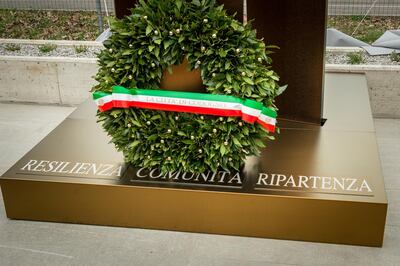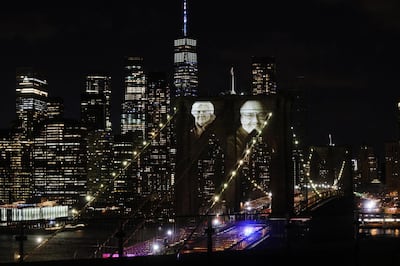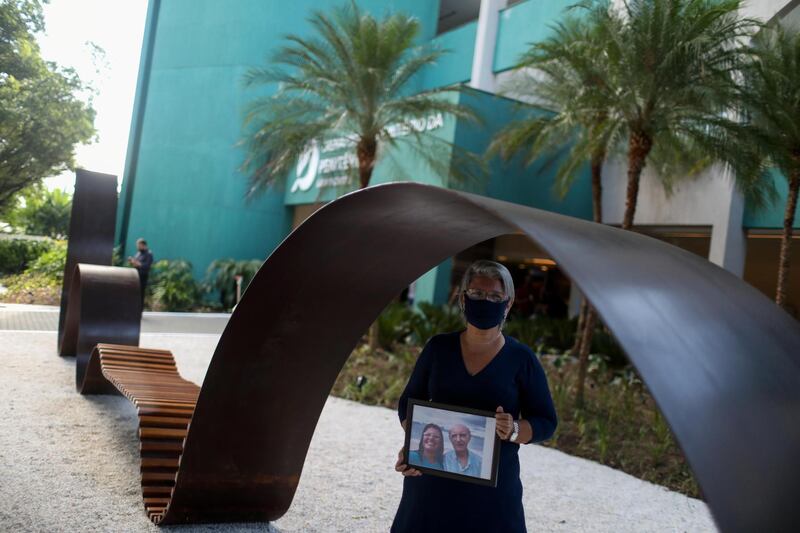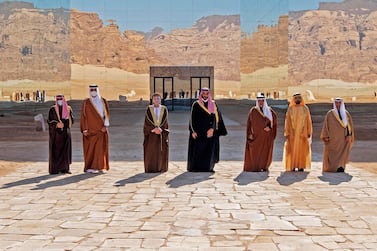More than 3.5 million people have died from Covid-19 across the world. And the majority of the approximately 168 million who recovered will have lingering effects. We cannot and should not forget the global toll of coronavirus from the past year and a half.
Although the pandemic is not even nearly over, there is planning and work under way to create permanent memorials for its victims around the world.
In the Italian town of Codogno in Lombardy, the centre of Europe’s first wave in February last year, a monument has been built to mark its first case and the first victim.
In London, a fund-raiser to create a memorial at St Paul's Cathedral hit its £2.3m goal in under a month, The Guardian reported this week.
New York's Department of Sanitation unveiled the city's first permanent, free-standing memorial to victims of the pandemic, the New York Times said, adding that it is likely to be the first of many.
In Uruguay, $1.5 million will be spent to erect a circular structure over the ocean, which will be able to accommodate 300 people, according to Forbes.
Brazil's Infinity Memorial in a Rio de Janeiro has been placed in a cemetery where many victims are buried, with their names to be etched into the 39-metre- long undulating steel ribbon.
Everywhere you go, the loss has been devastating and has been about more than daily statistics and travel restrictions. The stories are of lives taken by Covid-19 and the fallout from that loss. For too many people, there will never be a return to normal. The pandemic will be a marking post, a watershed, after which nothing will be the same.

For their sake and ours, we should try to remember this cost. These days it can often seem as if we are too quick to want to move on from what has occurred. It is understandable – to want to be able to feel we have overcome this global crisis and the concern for those vulnerable to the risks of contracting the virus.
Yet, moving forwards without properly acknowledging the past would be a mistake, which is why the wave of plans for permanent memorials is such a significant development, even as we do make headway to put the pandemic behind us.
The benefit of supporting plans for Covid-19 memorials goes beyond helping people process their feelings or for communities to grieve collectively.
Permanent memorials might also help us better avoid the danger of missing the lessons learnt and would lessen the risk of allowing another outbreak to occur again at the same scale.
Moving on will help the healing, yes, but the specific way of how we do this will shape how fruitful the future will be. Governments and leaders are aware of this.

The UK, which has the Presidency of the G7 nations is hosting an in-person leaders' summit in Carbis Bay, Cornwall next week, seemingly in the spirit of the fresh chance at unity facing down this crisis has given us. Australia, India, South Korea and South Africa have been invited as guests.
Before the summit, British Prime Minister Boris Johnson called for a global treaty “on pandemic preparedness", following a "terrible year for humanity" in 2020.
Mr Johnson also said nations had to do better to work together during a bad time "for believers in global co-operation, because the world simply became Balkanised."
His sentiments are timely. Tackling inequality – in particular access to vaccines – will mean the difference between life and death in some parts of the world. Even as you read this, sadly there are those who continue to fall victim to the virus. For their sake, we cannot view the recovery as a race to be won. That is the prevailing attitude of the past decade and it made the crisis worse.
Our priorities are also not clear. There are too many mixed messages about the commitment to co-operation.
Mr Johnson offers the correct words, but the actions of leading economic powers show they are doubling down on a series of Cold War-like confrontations with China and Russia. While it is important to address all risks, such conflicts, whether related to trade or technology, will distract us from more pressing needs.
For example, a number of opinion polls show that more Americans see political polarisation, domestic violent extremism, cyberterrorism and the spread of infectious diseases as major threats than those who put China and Russia at the top of the list.
When the G7 gathers on June 11 it will be critical to see which issues are given the most attention, and an acknowledgement of the recent, grim experience of Covid-19 and its victims would not go amiss either.
Mustafa Alrawi is an assistant editor-in-chief at The National






